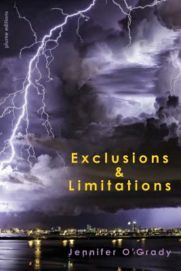 Jennifer O’Grady
Jennifer O’Grady
MadHat Press ($19.95)
by Eileen Murphy
Does your life feel safe? Perhaps it shouldn’t. “Our lives are not conceived with warrantees,” warns the speaker in Jennifer O’Grady’s tell-it-like-it-is second poetry collection Exclusions & Limitations. Suitably, this advice is found in a poem about the speaker’s own wedding ceremony, “where vows are made, [and] fates will be altered.” Later, in the poem “End of Summer,” the speaker notices that the sweet gum branch hanging over the walk “now seems a weight about to plummet / precisely on the spot where my child digs.” Exclusions & Limitations exposes the risky business of being a parent, of experiencing love, of being alive.
O’Grady’s poems about motherhood and infertility are the show stoppers of this collection, especially the ekphrastic poems about paintings of the Annunciation, created by John Collier, Fra Angelico, Henry Ossawa Tanner, and Tissot. According to these poems, both Mary, Jesus’s mother, and the angel, messenger of God, appear in each of the Annunciation paintings, but each painter has a different interpretation of this event and of the personalities of the participants. For example, in “Annunciation,” the speaker describes the angel in Fra Angelico’s fresco as someone
who casts no shadow, who will never be anyone’s
lover or mother, smiles as one
forever unencumbered
Whereas in “The Annunciation According to John Collier” we hear that
the angel
is film-star handsome,
more a gift than bearing a gift
The character of Mary is revealed to be complex as well; the paintings, as deconstructed by O’Grady, tell us what a mixed blessing the Annunciation is from Mary’s viewpoint. In “The Annunciation According to Tissot” the “urgent message” of the Annunciation is frankly depicted as “one that will spoil her life.” “The Annunciation According to Henry Ossawa” explains this perspective even further:
She will always be
at a disadvantage, needing proof
needing pain to make everything
clear, and even the life
already growing inside her
is unbelievable, until it nearly
tears her apart.
Indeed, motherhood and domestic life are not necessarily safe, and O’Grady’s poems about these topics are not safe, either. This collection successfully takes risks in both form and content. The poems’ highly relatable themes, atmospheric details, and clear language draw us in as readers, carrying us along on their thought trails. Compassionate, elegant, edgy, and intelligent, these poems are deeply moving.
